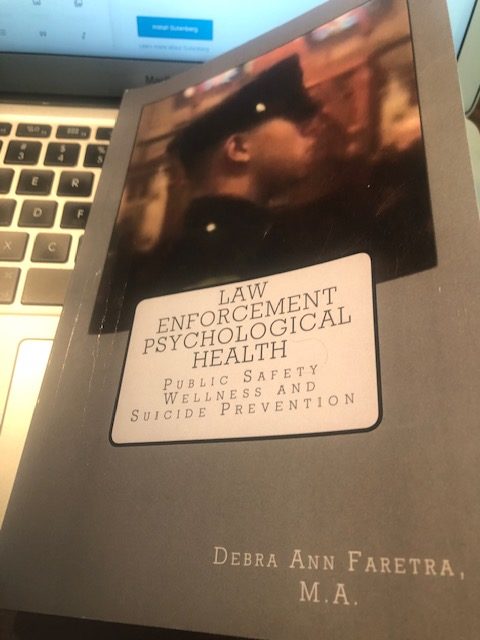I had the pleasure of speaking to the author of this book today. I recently started reading, Law Enforcement Psychological Health, while researching books for a paper. There are many factors in what causes stress or how we feel. No two incidents are the same, and no two people are the same. I am happy to say that this makes us unique and I stand by my belief, that if we were all the same it would be boring.
Back to this book and speaking to the author, who also is from New Jersey. I am pretty stoked about that. We spoke about many things. Stress, law enforcement, life and this amazing book. The chapter that Ms. Faretra pointed out was chapter 5, Disorders, more specifically, Seasonal Affective Disorder (SAD). Many of you know that I love researching ways to help reduce stress, but also things that you wouldn’t normally stumble upon in your daily reading. I must also remind you that I am not a therapist, and I am not giving you advice. But I highly encourage finding a therapist that can help you through these issues.
SAD is listed in this book as a subtype of depression that affects people when sunlight decreases every year.* The lack of sunlight and being outside contributes to adverse effects on hormone production. Most cases of this disorder are associated with insufficient sun exposure and vitamin D absorption. SAD is reported to be more prevalent in women with a genetic predisposition between the ages of 20 to 30 years of age. How men and women are affected differently is also listed in this book. Women are more likely to manifest emotional disturbances, and men have a tendency to be aggressive and manifest physical symptoms.*
How is Seasonal Affective Disorder treated?
Just as I had mentioned that we are all unique and we all experience things differently, such is the treatment of SAD. Treatment for this disorder is unique to each individual and their diagnosis, depending on their symptoms and test results.*
Some treatment approaches may be to undergo light treatment, hormonal therapy, psychotherapy, exercise, and diet programs. Always discuss your symptoms with a doctor and make sure that everything is fine. Don’t assume or treat yourself.
You all know how I feel about taking care of yourselves daily and what I ask of you to do daily. That is incorporating daily activities, to make you feel better. You should be taking time for yourself daily. Find what is relaxing for you and what makes you feel good. We invest a lot of time on products, work, school, families, but tend to forget about ourselves. I share a list below of things that you can start doing today to relieve stress and feel better. This list is only suggestions and of things that have helped me.
- Meditation
- Essential oils
- Deep breathing
- Exercise
- Following a healthy, clean diet.
One final thought that Ms. Faretra wrote about in this book is something that I talk about daily. Reducing stress can be done with adding cardiovascular exercise daily. DAILY. There are other things that you can do as well, and that could mean adding lifestyle changes and psychotherapy. There’s nothing wrong with talking to someone about your feelings and leaving them there for the day.
Please check out this book, it is full of amazing information and helpful tips.
Please take care of yourself, do something daily and stay safe out there.
*Faretra, D.A. (2018). Law Enforcement Psychological Health: Public Safety Wellness and Suicide Prevention.


Recent Comments